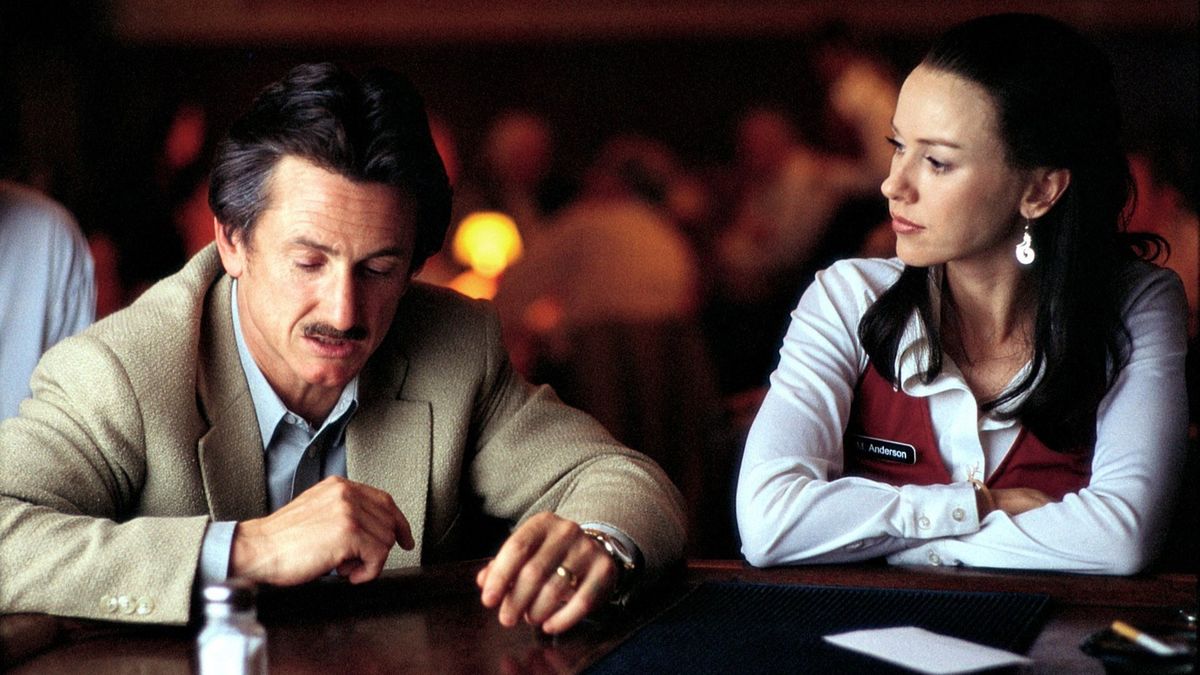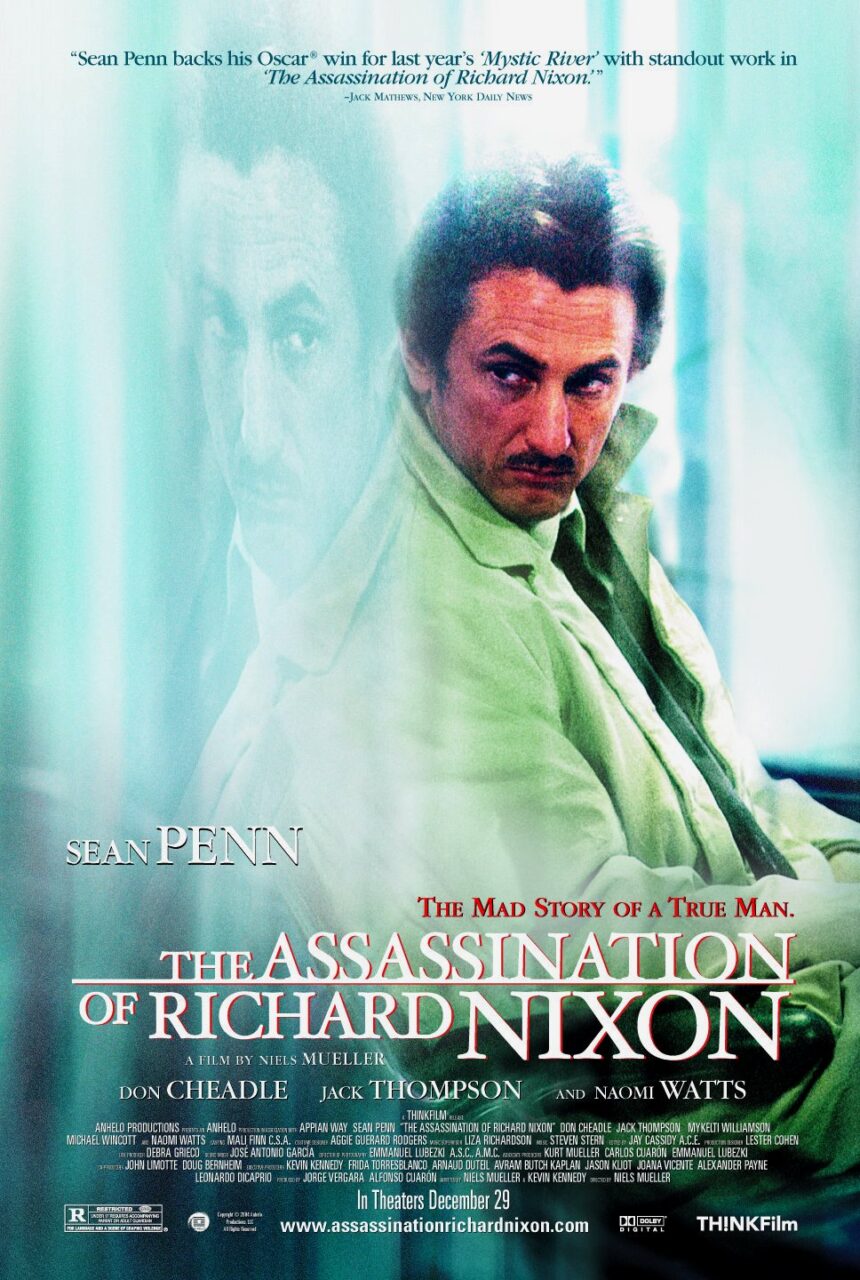USA. 2004.
Crew
Director – Niels Mueller, Screenplay – Niels Mueller & Kevin Kennedy, Producers – Alfonso Cuaron & Jorge Vergara, Photography – Emmanuel Lubezki, Music – Steven M. Stern, Visual Effects – iO Film (Supervisor – Adam S. Hawkey), Special Effects Supervisor – Frank Ceglia, Production Design – Lester Cohen. Production Company – Anhelo Productions/Appian Way.
Cast
Sean Penn (Sam Bicke), Naomi Watts (Marie Andersen Bicke), Don Cheadle (Bonny Simmons), Jack Thompson (Jack Jones), Nick Searcy (Tom Ford), Brad Henke (Marty Jones), Michael Wincott (Julius Bicke), Mykelti Williamson (Harold), Tracy Lynn Middendorf (Businesswoman)
Plot
1973. Sam Bicke is separated from his wife Marie and struggling to make it as an office furniture salesman after a string of failed jobs. Though he strives to perfect various positive thinking sales techniques, Bicke does not succeed in his job. He pins all his hopes on a small business loan that he needs to start up a travelling tire sales company. However, when the loan is rejected and his divorce notice comes through, all of Bicke’s failures collapse in on themselves. Having striven and failed to get anywhere through being honest, Bicke decides that he must make a statement against the biggest liar of them all – President Richard Nixon – by hijacking a plane and flying it into The White House.
The Assassination of Richard Nixon is a film based on the true-life figure of Samuel Joseph Byck (1930-1974). Samuel Byck’s contribution to history in an otherwise undistinguished life was on February 22, 1974, when he attempted to hijack a Delta Airlines flight from Baltimore-Washington Airport with the intent of flying it into The White House and killing President Richard Nixon. Byck shot the two pilots before he was wounded by a police officer shooting through the window of the plane’s door and then shot himself in the head. As The Assassination of Richard Nixon faithfully recounts, Samuel Byck had a history of business failure and came to resent government and the Nixon administration after being turned down for a small-business loan. As also recounted in the film, Byck attempted to join the Black Panthers and sent rambling tape recordings to a number of public figures, including composer Leonard Bernstein of West Side Story (1961) fame.
The Assassination of Richard Nixon joins a spate of films based on the lives of real-life killers and true crime stories that gained vogue in the mid-2000s with the likes of Ed Gein (2000), Dahmer (2002), Nightstalker (2002), Ted Bundy (2002), Gacy (2003), Wonderland (2003), The Hillside Strangler (2004), Hollywoodland (2006), Chapter 27 (2007) and especially the critically acclaimed Monster (2003).
The film is faithful to the details of Samuel Byck’s life. The major point of difference might be in the filmmakers changing of Byck’s name to Samuel Bicke so as not to upset Byck’s still living family and relatives. The title The Assassination of Richard Nixon has a certain attention grabbing sensationalism to it, as Richard Nixon only features as a distant figure throughout the film and the focus is more on the psychology of a madman and his hare-brained assassination scheme.
The odd thing that has never occurred to the filmmakers – or perhaps did and was downplayed for fear of sensationalising the issue – was that Samuel Byck was the first person to ever conceive of the idea of flying airplanes into famous American landmarks and would almost certainly have been a forgotten figure in the pages of history were it not for 9/11.

As a study in psychopathology, The Assassination of Richard Nixon has naturally been compared to Taxi Driver (1976), although one suspects that this has more to do with the similarity between the names of the two mentally unbalanced protagonists – Sam Bicke/Travis Bickle – and the vague similarity of the stories in both films where either protagonist attempts to assassinate a political figure. In other ways, The Assassination of Richard Nixon and Taxi Driver are very different films. In Taxi Driver, Travis Bickle is a former Vietnam Vet who was suffering from insomnia and is driven to stand up against the moral corruption that he sees in the city around him. In The Assassination of Richard Nixon, Sean Penn’s Samuel Bicke is a little man who is certainly trying to strike out at a corrupt world around him but also seems to be fighting for a significance in a world that has steam-rolled over him for being so milquetoast and refusing to be dishonest.
Taxi Driver is a film filled with a relentless, restless psychosis; The Assassination of Richard Nixon is a film filled with a claustrophobically weighty pressure to live an ordinary life, where the protagonist suddenly explodes into violence out of his failure to succeed in the world. If there is a film that one might compare The Assassination of Richard Nixon to it would be more Falling Down (1993). Though Falling Down and The Assassination of Richard Nixon are poles apart on the political spectrum, they both feature protagonists who are anonymous, ordinary working men who suddenly snap and take up armed resistance because they are tired of putting up with the petty injustices of life.
If there is a film that The Assassination of Richard Nixon comes the closest to in terms of ideas it would surely be Fight Club (1999). Both are films that take to task modern American society for its promotion of phoney ideals and its failing of the ordinary man. Both films seem deeply angry and wanting to do something about men who are expected to succeed in a ruthlessly competitive system that rewards the best liar instead of the most honest, of the pressures of the materialistic status symbol society, the need to maintain perfect marriages, successful careers and the like.
It is hard to tell if The Assassination of Richard Nixon fully sympathises with its protagonist, at least in the same way that Fight Club seems to be using a character like Brad Pitt’s Tyler Durden to offer up some kind of manifesto against the disempowerment of men in modern American society, but certainly the time that is placed into seeing things out through Bicke’s eyes, the focus of the writing and the analogies made between the corruption that Richard Nixon represents and the collapsing banality of Sean Penn’s life seem to be making a clear point.

One suspects that the writers had to pull a few punches and tread a careful line in not wanting to go too far and end up creating a film that offered sympathy for Bicke and his desire to fly a plane into the White House. As it is though, the script and debuting director Niels Mueller, whose only previous screen work had been the screenplay for the offbeat Tadpole (2002), do a remarkable job of getting inside the banality of Bicke’s life and showing the ordinariness of his frustrations and all-too-believable slip over into psychosis. Niels Mueller also does an excellent job of tying the film to the news media imagery of the time without going for the cliché headlines of the era shots that most period films do.
In the role of Samuel Bicke, Sean Penn gives an expert performance. There have been few performances on film where an actor seems to inhabit a role so completely. Sean Penn seems to be the portrait of dull nervousness and milquetoast mediocrity that we see on screen. We are completely drawn into the character’s banality and muted frustration.
Penn is surrounded by some equally good performances from Don Cheadle as his business partner and Naomi Watts as his estranged wife. Especially good is Australian actor Jack Thompson as Bicke’s boss where Thompson plays with a crass surety and bullying over-confidence. There is also a fine performance from Michael Wincott, usually best known as an actor who plays dangerous and psychotic thugs in films like The Crow (1994), Strange Days (1995), Metro (1997) and The Count of Monte Cristo (2002). Here Wincott tones the gravely psychosis down and plays calm and controlled as Bicke’s Orthodox Jewish brother Julius.
Niels Muller has yet to direct another film, although did go on to produce/create the Marvel Comics tv series The Defenders (2017). The Assassination of Richard Nixon is co-produced by Alfonso Cuaron, director of Children of Men (2006) and Gravity (2013), and the production company of Leonardo DiCaprio.
(Nominee for Best Actor (Sean Penn) at this site’s Best of 2004 Awards).
Trailer here


